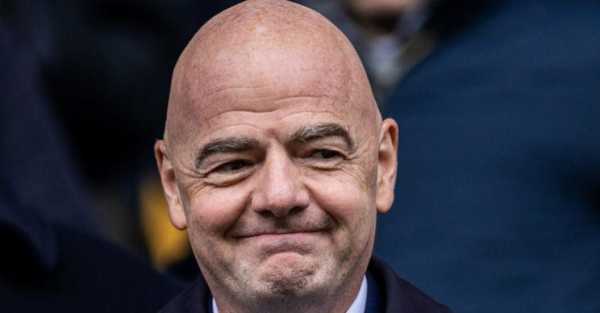
FIFA president Gianni Infantino feels equal pay at the Men’s and Women’s World Cups would only be a “symbol” that would not “solve anything” if additional development targets for the women’s game are not achieved.
On Sunday, England will play Spain in the final for their share of an increased prize pot of $110 million (£86.1m) for this tournament, more than three times than what was on offer for the 2019 Women’s World Cup in France, but still significantly less than the 440 million USD (£346m) awarded at the 2022 men’s competition in Qatar.
Advertisement
Infantino has previously outlined ambitions for prize parity by the 2026 and 2027 World Cups but two days before the conclusion of the ninth edition of the women’s showpiece, challenged stakeholders to do more.
Infantino said: “Let’s really go for a full equality. Not just equal pay in the World Cup, which is a slogan that comes up every now and then. Equal pay in the World Cup, we are going in that direction already.
Advertisement
Advertisement
“But that would not solve anything. It might be a symbol but it would not solve anything, because it’s one month every four years and it’s a few players out of the thousands and thousands of players. We need to keep the momentum. We need to push it. We need to go for equality but we have to do it for real.”
Two months before the tournament, Infantino threatened that he may be “forced not to broadcast” the World Cup in Europe’s ‘big five’ countries following what he felt were “very disappointing and simply not acceptable” offers from broadcasters, though deals were eventually done.
Viewing figures have broken records in Australia, where a peak 11.5 million people – about 46 per cent of the population – tuned in to watch the Matildas play England in their semi-final, the country’s most-watched television programme of any kind since 2001 when the existing rating system was established.
Advertisement
Back at home, the 7.3 million people who viewed the same contest on BBC One comprised the biggest UK audience of the World Cup so far, and on Friday Infantino reiterated his view that broadcasters have a part to play in the prize parity target.
The 2023 tournament was expanded to 32 teams, and is also the first time the competition has been hosted by more than one country.
Advertisement
Infantino said: “Some voices were raised, where it cost too much, we don’t make enough revenues, we will have to subsidise.
Advertisement

“And our opinion was, well if we have to subsidise, we will subsidise, because we have to do that.
“But actually, this World Cup generated over $570 million in revenues, and so we broke even. We didn’t lose any money, and we generated the second highest income of any sport, besides of course the men’s World Cup, at a global stage. More than half a billion (in revenues).”
The decision to include more teams initially drew scepticism that it would only highlight the disparity between lower-ranked teams and heavily-resourced nations at the top of the table.
Advertisement
Instead, this has been one of the most competitive finals on record, guaranteed a new champion after 2011 champions Japan were eliminated at the quarter-final stage, one round after double-defending title holders the United States were sent packing in the last-16.
World number four England managed just one goal against tournament debutants Haiti, 49 places below them in FIFA’s world rankings, while fellow debutants Morocco advanced to the last-16 alongside Jamaica, who were knocked out in the group stage in their only other appearance in a final.
Advertisement
Three top-10 sides in Germany, Canada and Brazil were eliminated in the group stage, while England’s quarter-final opponents Colombia advanced to the last eight for the first time.

And while breakout performances at this World Cup could lead some players to more lucrative contracts in places like Europe and the United States, FIFA’s most recent benchmarking report revealed the average league and club salaries for women worldwide was just 14,000 dollars (£11,000).
Infantino demanded: “Football in general, in all the leagues and all the competitions, pay a fair price. Show that you respect women and women’s sport. You will see the feedback that will be absolutely fantastic.
“We need to have more local competitions, more continental competitions, more international competitions because when you see some of the beautiful, stories that were written at this World Cup.
“We need to create the conditions in the next four years for them to able to play at professional level at home. This is the biggest challenge we have to take onboard.”
Sourse: breakingnews.ie






